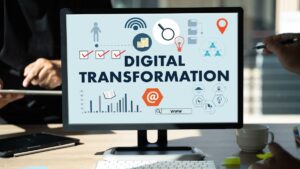RevTech (Retail Technology) Topics: Exploring the Future of Retail

RevTech, or retail technology, refers to the innovative use of technology to improve and transform retail operations, customer experiences, and business models. As the retail industry undergoes digital transformation, there are several key trends and topics driving this revolution. Below are some critical RevTech topics that are shaping the future of the retail landscape:
1. Omnichannel Retailing
Omnichannel retail focuses on creating a seamless customer experience across multiple channels—both online and offline. Key areas of focus include:
- Unified Customer Experience: Integrating physical stores, e-commerce platforms, and mobile apps to provide a cohesive shopping experience.
- Click-and-Collect/Buy Online, Pickup In-Store (BOPIS): This trend allows customers to shop online and pick up their products in physical stores, merging the convenience of online shopping with in-store experiences.
2. AI-Powered Personalization
Artificial Intelligence (AI) is transforming the way retailers interact with customers by offering personalized shopping experiences.
- Product Recommendations: AI-based recommendation engines use customer data to suggest relevant products based on previous purchases and browsing behavior.
- Chatbots and Virtual Assistants: AI chatbots help customers with queries and guide them through the buying process, enhancing customer service efficiency.
3. Retail Automation
Automation is becoming increasingly important in improving operational efficiency and customer service in retail.
- Automated Checkout Systems: Cashier-less stores, like Amazon Go, use AI and sensors to enable customers to walk in, pick up products, and walk out without a traditional checkout process.
- Inventory Management: Automation tools, such as robotics and AI, optimize stock replenishment, reducing errors and improving supply chain management.
4. Augmented Reality (AR) and Virtual Reality (VR) in Retail
AR and VR technologies are enhancing the way customers shop, especially online.
- Virtual Try-On: AR-powered tools allow customers to virtually try on clothing, accessories, or makeup before purchasing.
- Virtual Stores: VR enables customers to walk through digital versions of stores, giving them an immersive shopping experience from home.
5. Blockchain in Retail
Blockchain is being utilized to enhance transparency, security, and efficiency in the retail industry.
- Supply Chain Transparency: Blockchain allows retailers to track products from the source to the store, ensuring authenticity and reducing fraud.
- Secure Payments: Blockchain-based payment solutions ensure secure and transparent transactions, reducing the risk of fraud.
6. Sustainability in Retail Tech
Eco-conscious consumers are demanding sustainability in retail, and technology is playing a crucial role in driving this change.
- Circular Retail Models: Technology is enabling second-hand markets, product rentals, and subscription-based models, promoting more sustainable consumer behavior.
- Energy-Efficient Stores: Smart energy management systems are helping retailers reduce their carbon footprint through automation and real-time energy consumption monitoring.
7. Smart Stores and IoT in Retail
The Internet of Things (IoT) is enabling smart retail environments, improving both operations and customer experiences.
- Connected Devices: IoT sensors help retailers manage store operations, such as temperature control, shelf management, and customer traffic flow.
- Smart Shelves: Shelves equipped with IoT sensors can alert staff when inventory is low or if items are misplaced.
8. Data Analytics and Customer Insights
Retailers are leveraging big data to gain deep insights into customer behavior and preferences.
- Predictive Analytics: Analyzing historical customer data to predict future trends, enabling retailers to stock products that will resonate with their audience.
- Real-Time Analytics: Retailers use real-time data from online and offline sources to optimize pricing, promotions, and product availability.
9. Mobile Commerce and Payment Technologies
Mobile shopping and payment innovations are reshaping how consumers purchase products.
- Mobile Payment Solutions: Technologies like Apple Pay, Google Wallet, and QR code payments are making transactions more convenient and secure.
- Mobile Apps: Retailers are enhancing mobile apps to provide personalized offers, in-app purchases, and loyalty programs, driving customer engagement and retention.
10. Voice Commerce
Voice-activated shopping is on the rise with the adoption of voice assistants like Amazon Alexa, Google Assistant, and Apple Siri.
- Voice Search Optimization: Retailers are optimizing their websites and product listings for voice search queries to capture voice commerce opportunities.
- Voice-Powered Transactions: Voice commerce is allowing customers to make purchases using voice commands, creating a hands-free shopping experience.
11. Retail AI and Machine Learning
AI is transforming various aspects of retail from customer experience to backend operations.
- Demand Forecasting: Machine learning algorithms predict demand more accurately, helping retailers optimize inventory and reduce waste.
- Fraud Detection: AI-driven security systems analyze customer transactions to detect and prevent fraudulent activities.
12. Loyalty Programs and Customer Retention Tech
Retailers are using technology to create more engaging loyalty programs and improve customer retention.
- Gamified Loyalty Programs: Retailers are incorporating game-like elements into loyalty programs to enhance engagement and reward repeat customers.
- Data-Driven Loyalty: Personalizing rewards and offers based on individual customer behaviors through data analytics improves the relevance of loyalty programs.
13. Digital Twins in Retail
A digital twin is a virtual model of a retail store or product that helps in testing scenarios, improving layouts, and optimizing customer experiences.
- Store Layout Optimization: Digital twins can simulate customer traffic in stores, helping retailers improve layouts for better flow and sales.
- Product Development: Retailers can test new products virtually, optimizing design and functionality before committing to production.
14. Cybersecurity in Retail Tech
With the rise of digital payments and online shopping, cybersecurity is a top concern for retailers.
- Data Protection Solutions: Retailers are investing in stronger encryption and fraud detection tools to protect customer data and prevent breaches.
- Secure Omnichannel Experiences: Ensuring that customer data is safe across both online and in-store interactions is key to maintaining trust.
15. AI-Driven Marketing Automation
Marketing automation tools powered by AI are enabling retailers to engage customers in a more targeted and efficient way.
- Personalized Campaigns: AI tools can create tailored marketing campaigns based on customer behavior and preferences, increasing conversion rates.
- Automated Email Marketing: AI-driven email automation helps retailers send personalized messages at optimal times, boosting customer engagement.
Each of these topics highlights the technological innovations driving change in retail, enhancing everything from customer experience to operational efficiency. RevTech continues to evolve as retailers adopt cutting-edge solutions to meet the needs of a digitally connected world.







